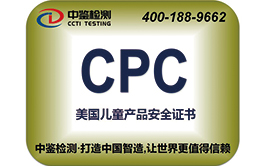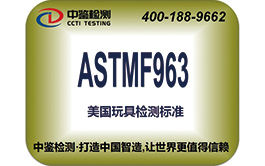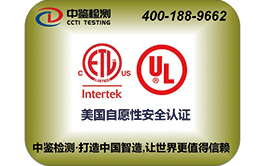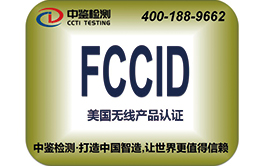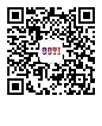SERVICE
CPSIA certification
CPSIA affects all industries in the United States that produce, import, and distribute toys, apparel, and other children's products and care products. All manufacturers shall ensure that their products comply with all the provisions, prohibitions, standards or rules of the Act. In addition to DINP, DIDP and DNOP, the phthalate content is temporarily banned until the CHAP study report is issued. DEHP, DBP and BBP have been permanently banned for use in the ban or listed as permanently banned. Must be tested by the US Consumer Product Safety Commission's CPSC accredited testing agency, otherwise it will face huge fines and lead to export disruption.

The Consumer Product Safety Improvement Act "(CPSIA) was passed by the US Congress and signed into law by Bush on August 14, 2008. CPSIA was designed to allow the US Consumer Product Safety Commission (CPSC) to better regulate and The safety of imported products in CPSIA in the United States also includes regulations for the purpose of keeping safer children under the age of 12, requiring manufacturers and importers to indicate that these products have no harmful lead and phthalates. Level. Almost every product, for children under the age of 12 will be sold in the US affecting CPSIA. This can include use and vintage products. The US Consumer Product Safety Commission (CPSC) will allow thrift stores, they do not sell products, maybe Containing high concentrations of lead and still maintaining the sale of these products is not a law per CPSIA.
On December 17, 2014, the US Consumer Product Safety Commission voted to approve its amendment to the phthalate restriction in children's products. Once the proposal is officially announced, it will revise 108 of the existing Consumer Product Safety Improvement Act (CPSIA). Section.
According to this recommendation, the temporary restrictions on DINP in the current Consumer Product Safety Improvement Act (CPSIA) will be permanently restricted, removing the now temporarily restricted DNOP and DIDP, and permanently limiting the other four new phthalates. (DIBP, DPP, DnHP, and DCHP).
CPSC: Consumer Product Safety Commission, Consumer Product Safety Commission;
CPSIA: Consumer Product Safety Improvement Act, Consumer Product Safety Improvement Act;
H.R.4040: Bill of the Consumer Product Safety Improvement Act;
ASTM: American Society of Testing Material American Society for Testing Materials
ASTM F 963: Standard Consumer Safety Specification for Toy Safety;
Children's products: refers to consumer products designed primarily for use by children under 12 years of age;
Children's toys: Designing consumer products for children under 12 years old to play with;
Child care products: Consumer products designed to help children under 3 years of age promote sleep, feeding, helping children to suck or grind their teeth.
CPSIA content overview:
Effective on August 14, 2008 Title I- Children’s Product Safety Chapter I - Safety of Children's Products
Sec.101.Children’s products containing lead, lead paint rule Children's products containing lead, paint lead regulations (section 101)
Sec.102.Mandatory third party testing for certain children’s product. Certain children’s products are subject to third party testing (section 102)
Sec.103.Tracking labels for children’s products. Children's Product Tracking Label (section 103)
Sec.104.Standards and consumer registration of durable nursery products. Durable baby product standards and consumer registration (section 104)
Sec.105.Labeling requirement for advertising toys and games. Labeling requirements for toys and games advertising (section 105)
Sec.106.Mandatory of toy safety standards. Compulsory toy safety standards (section 106)
Sec.107.Study of preventable injuries and death in minority children related to consumer products. Prevention of injury and death related to some children's products (section 107)
Sec.108.Prohibition on sale of certain products containing specific phthalates. Prohibition of the sale of certain products containing specified phthalates (108)
Sec.102 enforces third-party testing
Federal law requires manufacturers and importers to test many consumer products to demonstrate compliance with consumer product safety requirements.
Based on the results of the conformance test, the manufacturer or importer must prove that the consumer product meets the applicable consumer product safety requirements in the form of a written or electronic certificate.
The certificate must accompany the product or shipment and must be provided to the retailer, distributor and copy.
Shenzhen CCTI Technology Co., LTD. (English abbreviation: CCTI TEST, Chinese abbreviation: Zhongjian Testing) is an excellent new testing and certification organization, providing high-efficiency electronic and electrical products to Europe, America, Australia, Japan, and other countries for overseas certification and testing certification. The project includes CE certification, ERP certification, ROHS certification, FCC certification, FDA certification, IC certification, SAA certification, C-TICK certification, PSE certification, IP rating certification, SONCAP certification. It can also authorize toy products EN-71, ASTM F-963, EN62115, PAHS, REACH, CCC and other certification projects.
Create China's wisdom and make the world more trustworthy! Zhongjian Testing, focusing on global international certification, is an authoritative testing institution worthy of trust and trust!

